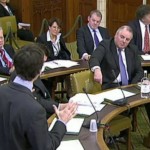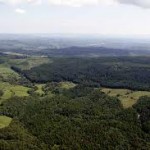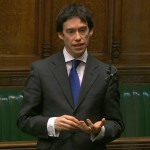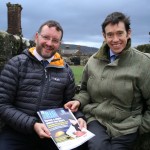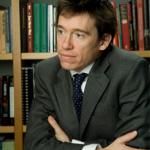A NEW IDEA OF BRITAIN
Five years ago, walking around Cumbria, I was mesmerised by the echoes of the past. In a section of the Lowther valley, only one new house has emerged since 1700: the white farm-buildings, built into the steep slopes evoked a remote community in the Indian Himalayas. Nature was insistently present: in the ash leaves, slowly emerging; in the cold clarity of the night skies; and the sound of ewes in the morning. So was pre-history, in the three and a half thousand-year-old stone monument nestled in an amphitheatre of tens of thousands of river stones, at Mayburgh. It was not difficult to imagine the Jacobite army, whether chasing the Bishop of Carlisle along the Lowther ridge-line, or retreating through Clifton. This landscape of isolated villages and uplands, deeply marked with history and conflict, stretched from Cumbria and Northumbria to the Scottish borders. It was the landscape of a Middleland – an autonomous zone, not part of either England or Scotland. And its elements – Anglo-Saxon, Viking and Celt – its green and often cloudy hills, seemed foundation stones of a much broader British identity.
But in 2011, Alex Salmond decided to hold a referendum, pressing for Scottish independence. This vote threatened to replace that broader identity and history, with simpler, narrower ideas of ‘Scotland’ and ‘England.’ So I, when I went on a longer walk through Cumbria and the Borders last summer, hoped to uncover – at a slow walker’s pace – the liveliness and richness of British identity, and expose the shallowness of the arguments for separation. At first, the echoes of soil and landscape were, almost, what I had expected. Eric the farmer at Ullswater, Barry the Blencathra huntsman, and Ron a retired horse-dealer in Dearham, were strongly shaped, it seemed, by the places in which they worked. I walked past the burnt shell of a medieval abbey and then met the family whose son had burned it. I saw how the lands that monks had drained were being reflooded. I forded the Solway with Mark, who fished in the Viking haaf-net tradition, and chatted to Duncan, who continued to celebrate the border reiver tradition in everything, including his son’s name “Reeve’.
But, on entering Scotland, such moments seemed more misleading. The Borders was one of the most remote, sparsely populated areas in Britain. But it felt startlingly divorced from history. The crofts and family farms were almost all long gone, replaced with large farms whose tenants had often moved only to the area since the Second World War. A landscape, once defined by medieval castles, monasteries and conflict, was now hemmed in by the council-tended banks of the slow-flowing Tweed. The traditional figures of rural life – farmers, labourers, landowners, priests, doctors, schoolteachers, policemen – seemed to have shrunk, changed, or vanished entirely. Most people were either commuting, or had retired, so their memories or interests were in another place. Over 90 per cent of people had not been born in the village in which they lived. There was little oral history, and very little interest in, or affection for, British institutions – least of all Parliament. British identity seemed very weak. Although Northumbrians told me they were honorary Scots, no Scot repaid the compliment.
People often seemed powerless, and marginalised – never quite able to bring their idealism or skills to use – stuck with jobs and governments and an environment they disliked but felt unable to change. Few seemed to feel the deep, rich connections to landscape, history and institutions which once underpinned British identity. Many said their ‘hearts’ were in favour of Scottish independence; and they repeated fragments of history, which were very flattering to Scotland. But they denied that their nationalism had anything to do with history – they justified independence simply in terms of getting rid of a Tory government. There was profound loss – of the past, of cultural structures, of traditions, values, of local particularity, and above all of confidence. And, then turning South again, similar things seemed true of many Cumbrian villages. It was disheartening.
Yet almost every door was a revelation. You could not guess which countries people had visited, where they had lived, or what interests they had (interests included American model train-sets, fair-trade in the Leeward islands, and the design of apps for river-walkers). There were no Christian monks, but there were strong communities of British Buddhist monks from different Tibetan and Japanese traditions. People had never been so educated, healthy, or highly, unpredictably, individual. Everywhere, was the pulsing presence of remarkable individuals whose lives, interests and tastes were almost entirely different to those of their parents.
Scottish nationalists talk of modernity, and the death of the old Britain. They acknowledge the inventiveness, and modernity, in remote communities. But their proposal is to create a smaller country confined to borders abandoned four hundred years ago. This is exactly wrong. If people’s identity is based on history, then it is a history of more than just Scotland or England. If it is about modernity, then history itself hardly features. To liberate new talents, energies, and imaginations, we need a framework capacious and various enough to accommodate tens of millions of individuals. We need a context which allows separate local identities to flourish alongside very different cultures: a context that would encompass Cumbria, as well as Aberdeen, or London. Our culture often seems to lack a common goal, to lack hope. The solution cannot lie in history, or inventing a smaller Scotland. But there is hope in a new idea of Britain.






